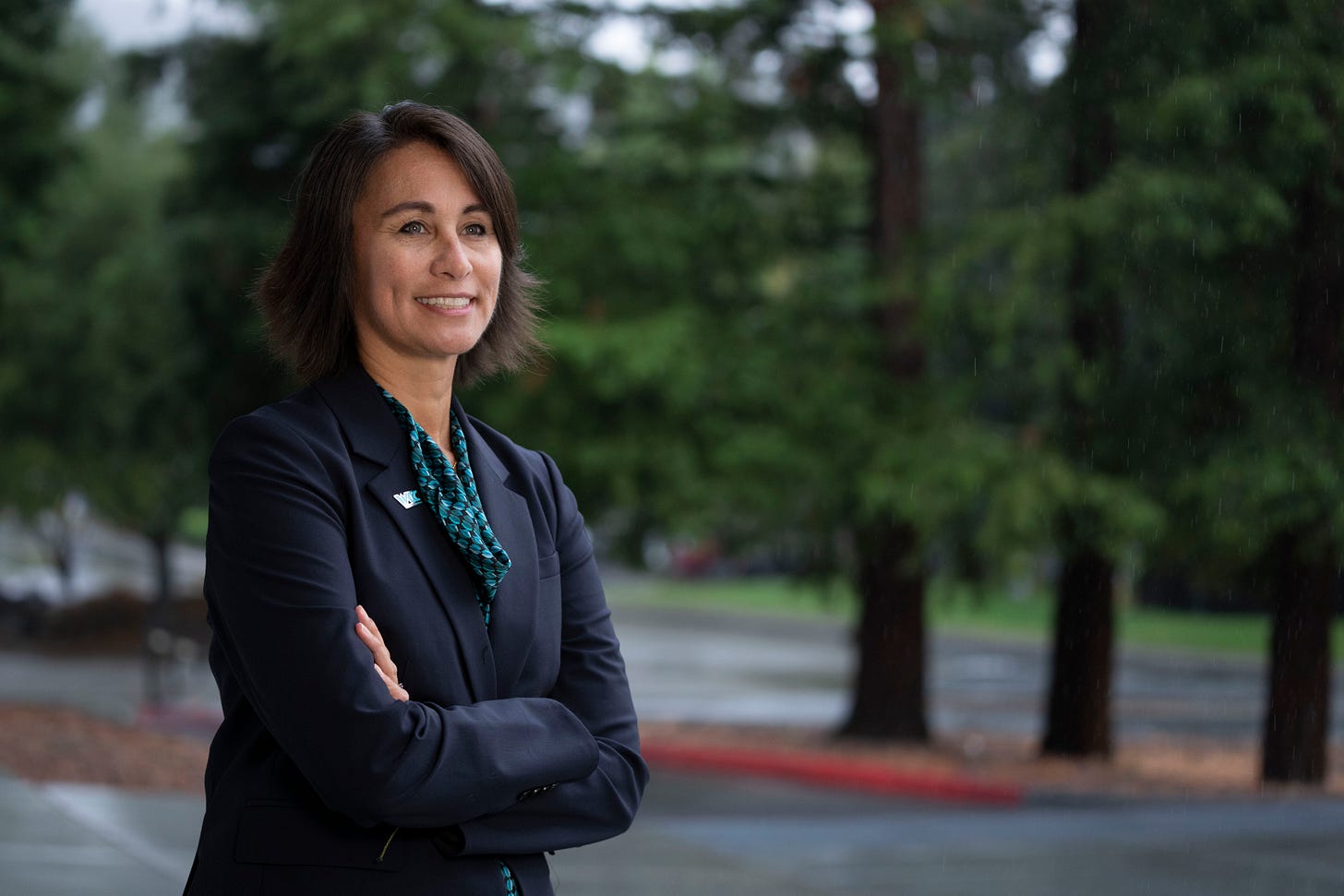Canzano: Commissioner Gloria Nevarez sounds off on leadership, college sports and mastering the assignment
Q-and-A with Gloria Nevarez.
Gloria Nevarez is the commissioner of the West Coast Conference. She previously worked as an administrator at the Pac-12 Conference, San Jose State, Cal and the University of Oklahoma.
Nevarez is a respected leader with a strong record and rich sports background. She played college basketball on scholarship at the University of Massachusetts and earned a law degree from UC Berkeley.
Is college athletics broken? What is good leadership? And what experiences helped shape her path?
The WCC commissioner joined me this week for a candid Q-and-A to talk on a variety of subjects:
Q: How do you make staff members feel like they’re part of a team?
GLORIA NEVAREZ: As a group we are constantly talking about communication and culture at our all-staff meetings to ensure we are all prioritizing our team atmosphere and ensuring we’re all invested in building a solid team culture.
Q: What ritual do you include in your routine?
NEVAREZ: Walking my dog. 90 pounds of Dutch Shepard rescue love. It’s a great way to take breaks during the day and get out in nature.
Q: What experience in youth sports helped shape you?
NEVAREZ: I remember feeling very self-conscious about trying out for a select soccer team because many of the other girls played together at an elite private school and were all friends. I was shy and played very timid until I realized that I might get cut from the team. So, I let it all out, played hard and eventually made the team. I learned that I was the only one holding me back.
Q: What book are you most likely to give to someone else as a gift?
NEVAREZ: “7 Habits of Highly Effective People” — early in my career in sports I was the sole compliance person for 27 sports and 950 student-athletes. I had work and questions coming at me from all directions. I was failing in my ability to organize, prioritize and get things done. This book helped me organize myself and my workflow based on priority and deadlines.
Q: Tell me about a great leader you’ve spent time around… and one thing you learned.
NEVAREZ: While I haven’t been lucky enough to spend a lot of time around Bill Russell, I’ve learned a lot from his journey. He took a stand on racial inequity when he had a lot to lose. Sport was his profession and platform and he used his market power in sport as a platform for what he believed in.
Q: Gonzaga men’s basketball is a national power and an asset to the WCC, but it’s one member of a larger conference. How does the WCC balance serving the bulk of its members while simultaneously promoting/elevating that top asset?
NEVAREZ: The culture of a healthy conference is balance. Teams and schools are going to move up and down the spectrum of strong versus rebuilding and a healthy conference provides opportunities for those rebuilding to improve while not holding back the excellence at the top of the conference. A running joke among commissioners is that if half the schools like you and half don’t on any given issue, you’re probably doing what’s best for the league as a whole.
Q: If we were writing a book about “Leadership Laws” what is one law you’d suggest we include?
NEVAREZ: Master the assignment. Do the job and do it well no matter how low profile or unchallenging. It’s understanding what it takes to run an organization that has helped me target issues and support those people working on addressing the challenges.
Q: You’ve been in a lot of arenas and stadiums over the years… what’s your favorite non-West Coast Conference one to watch a game in?
NEVAREZ: The Curry Hicks Gym at UMass (old gym, they now play in Mullins Center)… lots of hours spent in Curry Hicks. Dr. J played there. It always smells vaguely of chlorine because of the indoor pool nearby and the walls sweat during the winter when the gym is packed with fans.
Q: When did you decide you wanted a career in athletics?
NEVAREZ: During law school when I began to realize that I didn’t want to be regulated by the billable hour. I created an externship that allowed me to earn course credit for working in compliance. This was in the early days when compliance roles were just becoming common place and I found it a great way to combine the legal training with something I loved to do.
Q: How many times in the course of your day does the transfer portal and NIL come up?
NEVAREZ: At least once or twice a day.
Q: What do you say to college sports fans who are worried about what is becoming of college athletics with transfer portal, NIL, and the mercurial feel that it all has right now?
NEVAREZ: The majority of college sports (Divisions II & III) and all other sports beyond Division I football and men’s and women’s basketball are by-and-large working well. Student-athletes are graduating and getting amazing collegiate experiences through participation in sport. We have big issues to solve. Those issues have significant impact on leagues and revenue generation. I would just caution on labelling the entire enterprise as broken when the vast majority of student-athletes are getting a very positive experience through participation in college sports. I believe we can find a way to solve the big issues and preserve what has been a beneficial and special experience for thousands of students.
Thank you for reading. I appreciate all who have supported, subscribed and shared my new independent endeavor with friends and family in recent months. If you haven’t already — please consider subscribing.



I am glad I am a subscriber. Keep ‘‘em coming! Thanks.
Sounds like she’s done her homework along the way and brought her own touch to the job. Wishing her continued success